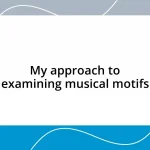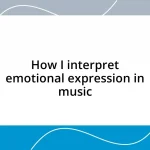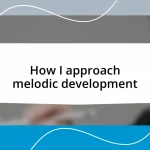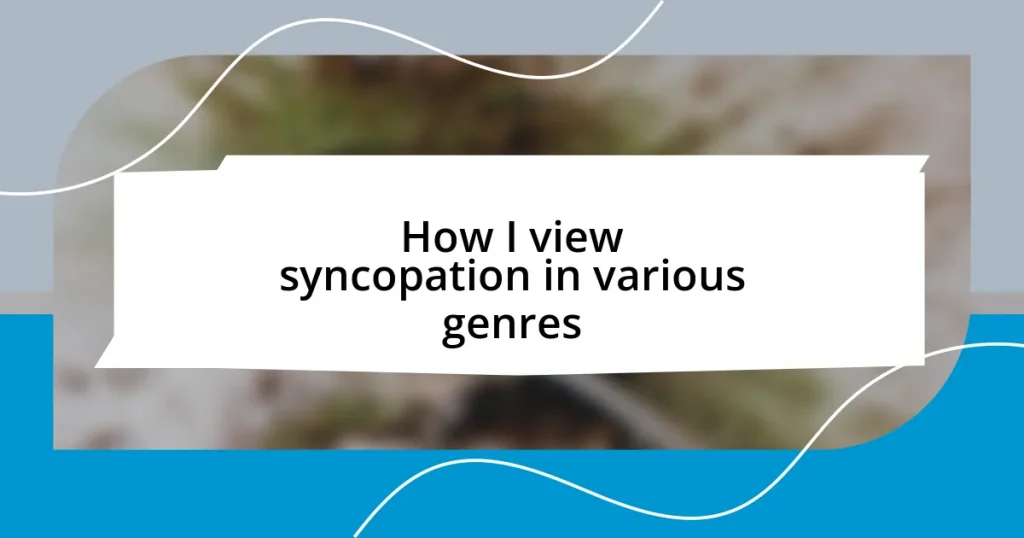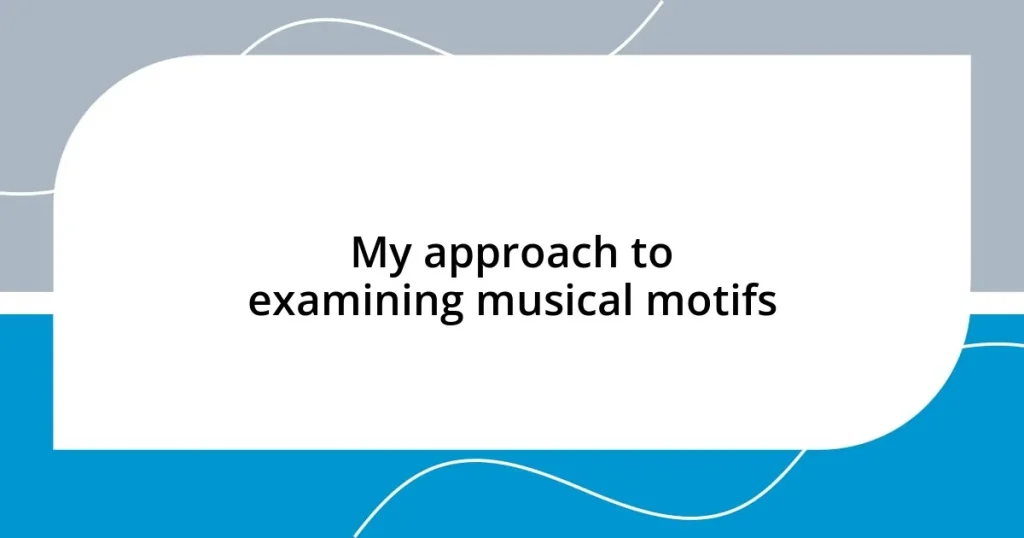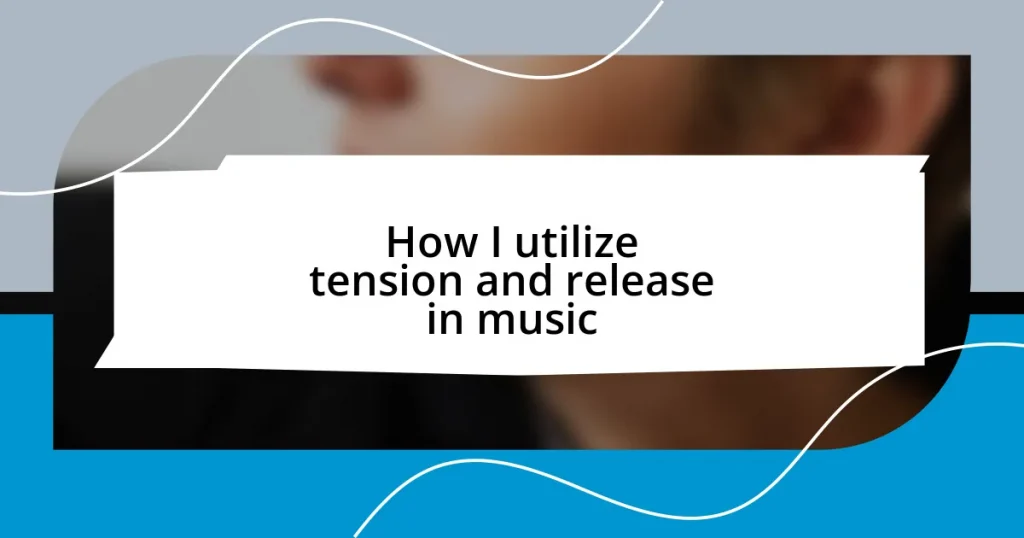Key takeaways:
- Musical composition connects emotions and storytelling, creating deep bonds between composers and listeners.
- Composers like Mozart, Beethoven, and Chopin evoke profound feelings and reflect cultural contexts through their music.
- Each composer’s struggles and personal experiences infuse their works with universal themes, allowing listeners to relate deeply.
- Analyzing specific pieces reveals the blend of technique and emotion that defines each composer’s artistic brilliance.
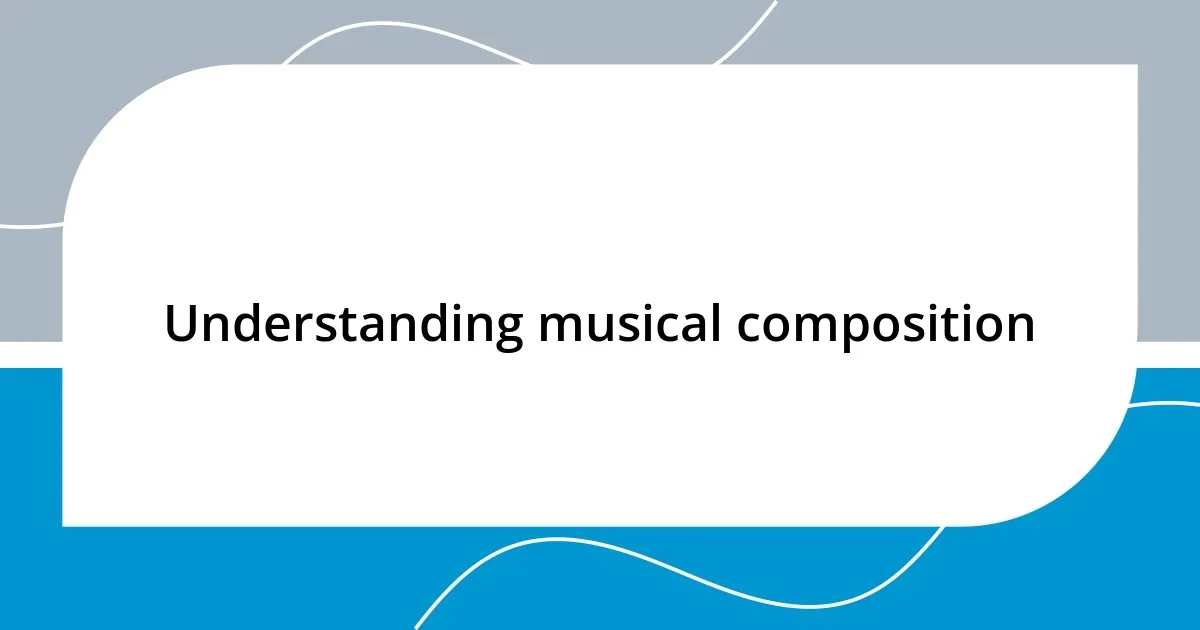
Understanding musical composition
Musical composition is like painting with sound; it involves creating a palette of melodies, harmonies, and rhythms that evoke emotions. When I first tried composing, I felt a rush of excitement mingled with anxiety—what if I couldn’t get my ideas down? That fear quickly turned into a thrill as I discovered that each note could tell a story, creating an intimate connection between the music and its listeners.
The art of composition isn’t just about technical skills; it’s about emotion and expression. I remember the first time I played a piece I had written for my friend’s birthday. Their smile lit up the room, and in that moment, I realized how powerful music could be—it transcends words. Have you ever felt that electric connection where the music spoke to your soul? That’s what true composition achieves.
Understanding musical composition means exploring not just structure but the very essence of creativity. I often reflect on how each composer brings their unique voice into the world, and it prompts me to question: what experiences shape our musical identities? Each melody and chord progression can reveal parts of a composer’s life, turning their personal journeys into universal experiences that resonate across time and space.
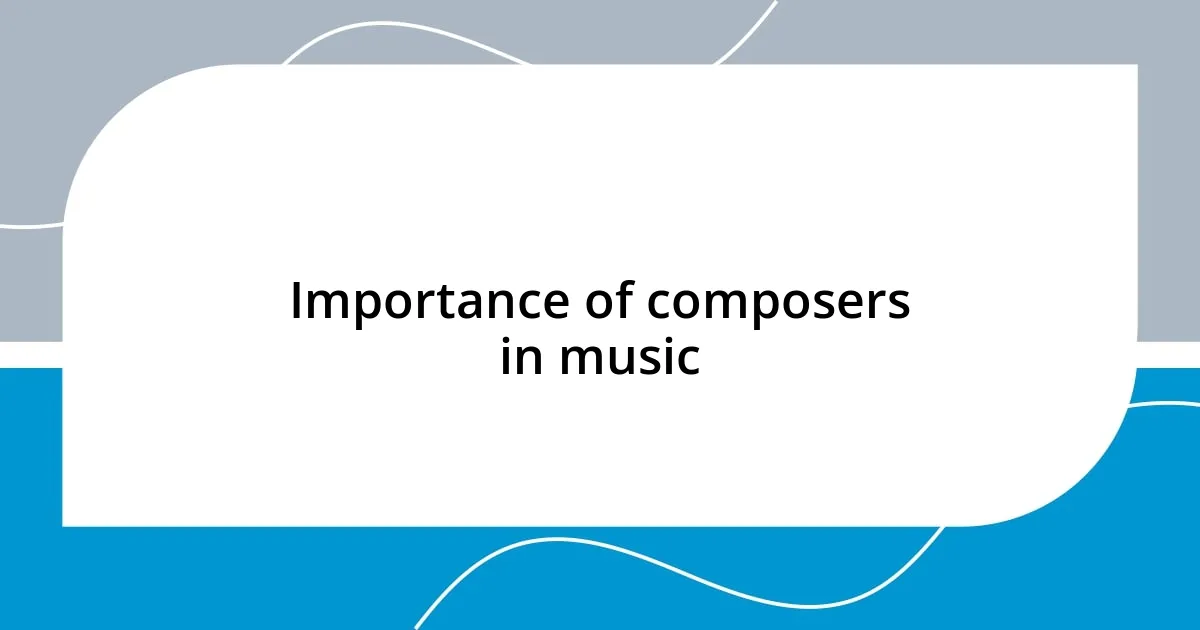
Importance of composers in music
Composers play a crucial role in shaping the music we love. They craft soundscapes that capture the essence of human experience and evoke deep emotions. For me, discovering a new piece by a beloved composer is like unwrapping a present. The anticipation builds as each phrase unfolds, revealing layers of meaning and beauty.
A few key points highlight the importance of composers in music:
- Emotional Connection: Composers tap into universal feelings, allowing listeners to experience joy, sorrow, or nostalgia.
- Cultural Reflection: Their works often mirror the social and historical contexts in which they lived, providing insight into different eras.
- Innovation and Influence: Composers push boundaries, experimenting with new forms and styles that inspire future generations.
Reflecting on my favorite composers, I realize how their creations have soundtracked pivotal moments in my life. When I listen to Beethoven’s symphonies, I can’t help but feel a sense of triumph and resilience, reminding me of the challenges I’ve faced and overcome. It’s a powerful experience, illustrating how composers serve as the architects of our musical journeys.

Notable composers in history
Notable composers throughout history have left an indelible mark on music, shaping genres and influencing countless artists. For instance, I remember the first time I listened to Mozart’s “Requiem.” It was as if the music wrapped around me like a comforting blanket, illustrating how deeply emotion can permeate artistry. Each note felt like a whisper from the past, reminding me that music is not just notes on a page but a powerful expression of human experience.
Consider Beethoven, whose innovative spirit transformed classical music. I often find myself drawn to his Fifth Symphony, particularly how it embodies struggle and triumph. The iconic “da-da-da-DUM” motif speaks to any listener, igniting feelings of determination. It’s fascinating to think how Beethoven composed some of his greatest works while facing deafness—truly a testament to perseverance and passion for his craft.
Then there’s Chopin, who seemed to blend personal pain and beauty in his compositions. Whenever I play his nocturnes, I feel a profound connection that stirs my deepest emotions. He used the piano almost like a voice, conveying feelings that words could never express. This makes me wonder: how do composers channel their emotions into music that resonates through generations?
| Composer | Era |
|---|---|
| Mozart | Classical |
| Beethoven | Classical/Romantic |
| Chopin | Romantic |

My top three favorite composers
My top three favorite composers—Mozart, Beethoven, and Chopin—each hold a special place in my heart for their unique ability to express profound emotions through music. I still vividly recall the first time I played a Mozart sonata; every note felt like a dancing spark of joy. It’s as if his melodies could lift my spirits and brighten even the bleakest days. How can such simple notes convey such happiness?
Beethoven’s powerful symphonies resonate deeply with me, especially during times of personal struggle. Whenever I hear the powerful opening of his Fifth Symphony, it’s like a call to action, urging me to face my challenges head-on. I remember listening to it while preparing for a crucial exam—it filled me with an unexpected strength. Isn’t it incredible how a piece of music can embolden us in the face of adversity?
Chopin’s delicate and expressive piano works, particularly his preludes, evoke a sense of bittersweet nostalgia. The first time I heard “Prelude in E Minor,” I felt as if my heart was being pulled through a kaleidoscope of emotions. I often turn to his music during late-night study sessions, where his lyrical lines provide a comforting backdrop. Why is it that some composers can capture the essence of our inner thoughts so beautifully? That’s the magic of Chopin for me, bridging my soul to his through every heartfelt phrase.
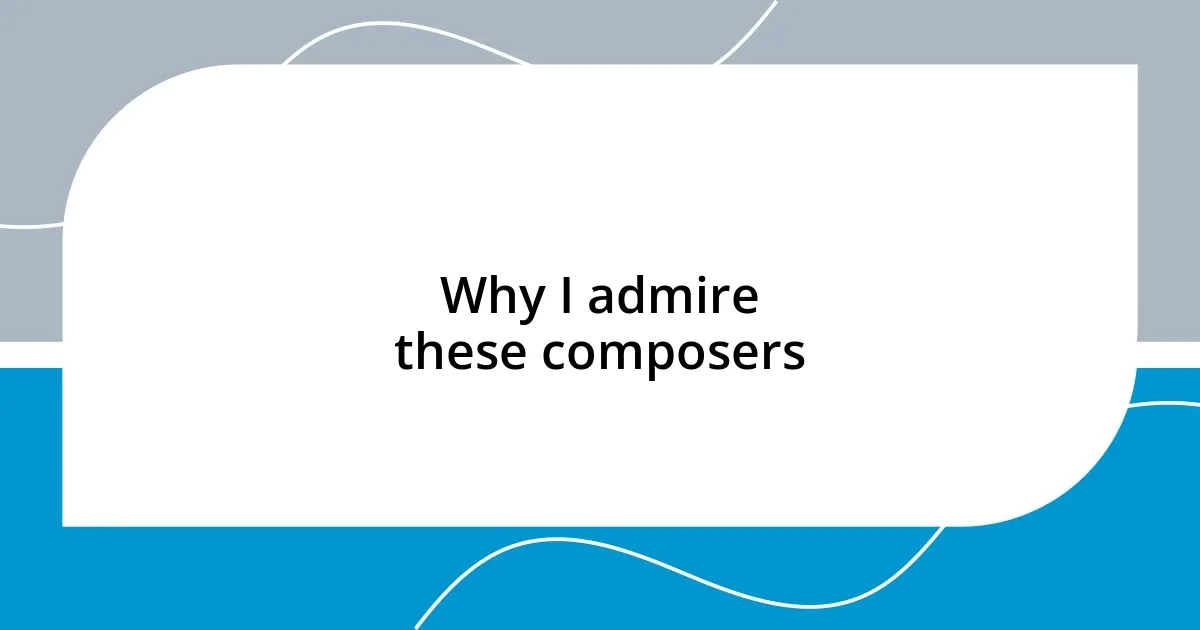
Why I admire these composers
What I find remarkable about these composers is their ability to translate complex emotions into music that resonates deeply with the listener. For instance, I often recall a rainy afternoon spent listening to Chopin’s “Nocturne in C-sharp Minor.” The haunting melody paired with the pitter-patter of rain created a serene atmosphere where I felt every note echoing my own joys and sorrows. It’s moments like these that make me realize how music can act as a mirror, reflecting our innermost feelings.
Beethoven inspires me not only because of his remarkable compositions but also due to his unwavering determination. One particular memory stands out: I was grappling with a personal setback and stumbled upon a recording of his “Moonlight Sonata.” As I listened, the ebb and flow of the music mirrored my own tumultuous emotions, transforming my sadness into a sense of reflection and hope. It leads me to wonder: how did Beethoven harness such raw emotion into his music despite his hearing loss?
Mozart, with his brilliance and joyfulness, never fails to uplift my spirits. I remember playing his “Eine kleine Nachtmusik” during a family gathering, and the room filled with laughter and smiles as everyone began to hum along. That piece feels like sunshine on a crisp day, igniting a sense of happiness that reminds me of the simpler joys in life. Isn’t it incredible how certain pieces can instantly brighten our mood and create cherished memories? That’s the magic of Mozart for me.

Analyzing their most famous works
Analyzing Mozart’s “Piano Concerto No. 21” reveals a captivating blend of elegance and playfulness. I remember being swept away by the second movement, “Andante,” during a late-night practice session. The way the melodies intertwine feels like a gentle conversation between the piano and orchestra, leaving me questioning how such structured beauty can also feel so spontaneous.
Beethoven’s “Symphony No. 7” always strikes a chord within me, particularly during its lively third movement. I can’t help but recall a road trip with friends when we blasted that symphony, the rhythmic pulse igniting our spirits as we sang along. In moments like those, the music transforms into an exhilarating celebration of life, leaving me to wonder: how can music connect us so profoundly, transcending language and culture?
Chopin’s “Ballade No. 1” takes me on a journey filled with both tension and release. I distinctly remember the first time I played it; as I navigated its dramatic contrasts, I felt as if I were unraveling a personal story. The way each phrase builds and falls away resonates deeply with the ups and downs we all experience. What is it about his ability to turn personal struggle into something universally relatable that leaves me in awe? The answer lies in his masterful capacity to blend technical brilliance with deep emotional insight.


